Ink Examines an Early Battle in Rupert Murdoch's Conquest of the Media
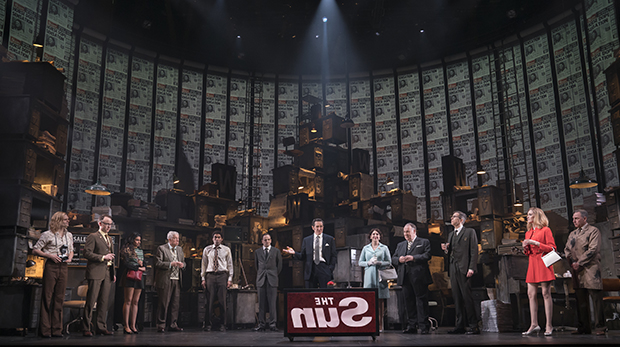
(© Joan Marcus)
"Disruption" might just be the cliché of our age, but this tech industry buzzword for the demolition the old to make way for the new represents an ancient story, stretching from Alexander to Napoleon to Rupert Murdoch. The overlord of Fox News and bête noire of liberals everywhere is one of the subjects of James Graham's Ink, now making its US debut with Manhattan Theatre Club. Undeniably entertaining and unapologetically theatrical, Ink slaps a new headline on an old chestnut — but will its viewers emerge from the darkness of the Samuel J. Friedman Theatre enlightened about a process that still blindsides so many?
Before there was Fox News, there was The Sun. The play opens in 1969, when Australian media magnate Murdoch (Bertie Carvel) purchases the struggling British newspaper for a song. He asks Larry Lamb (Jonny Lee Miller) to edit. The son of a Yorkshire blacksmith, Lamb is the best subeditor in the business. But he was not educated at Oxford or Cambridge, and he knows that the classist owners of the more reputable papers on Fleet Street (the hub of British newspapers) will never allow someone like him to take the helm. So he signs on with Murdoch, who tasks him with transforming The Sun into the most read tabloid in the UK. "Look how they laughed, they laughed at you, Larry," the Devil from Down Under whispers into the ear of his new minion. "Let's burn it all down, and start again."
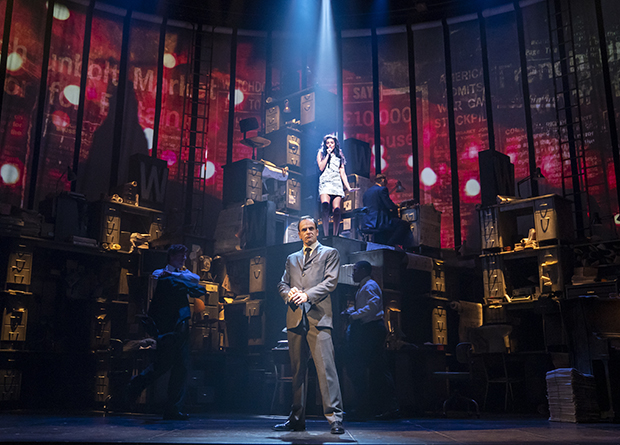
(© Joan Marcus)
Much of Graham's restless script plays out like every American sports movie from the past half-century: An aggrieved but talented coach assembles a ragtag team of misfits that, through unconventional methods, improbably comes from behind to win the championship. The supporting actors jell as a merry band while accentuating their characters' individuality, from woman's editor Joyce Hopkirk (a no-nonsense Tara Summers) to the golden-maned photographer Beverley Goodway (a delightfully spacy Andrew Durand). Broadway audiences might roll their eyes at this formula, but it constitutes a powerful and dangerous myth — the kind that destroys industries and topples governments.
Alongside Hoosiers, Graham's other great influence seems to be Macbeth, especially in his dramatization of the siren call of ambition (Rana Roy embodies this metaphor as a cabaret singer clad in a sexy newsprint dress). As Lamb inches closer to overtaking the circulation of the industry-leading Daily Mirror, he resorts to increasingly unorthodox (and unethical) means. The most shocking example is The Sun's relentless coverage of the abduction of Muriel McKay, the wife of Murdoch deputy Alick McKay (a sympathetic Colin McPhillamy). Muriel's ransom notes become front-page fodder, keeping her captors up-to-speed with the police (we wonder if Lamb would have been so cavalier had the kidnappers succeeded in capturing their original target: Anna Murdoch). Eventually, Lamb is in ink stepp'd in so far (to riff on Macbeth) that returning to the shore of ethical journalism would be as tedious as wading over to the dark side.
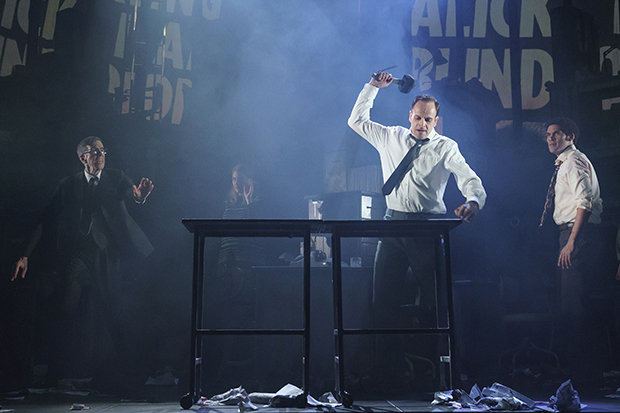
(© Joan Marcus)
Director Rupert Goold tells this story by literally splattering Lamb's white shirt in ink, the physical evidence of his crimes. Like much of Goold's production, it is unsubtle and gets the point across.
The production is the real star: Bunny Christie's set is a mountain of rusting desks on which the cast busies itself like ants on a hill, all clad in the fashions of London in the swinging '60s (authentic period costumes also by Christie). Neil Austin's muscular lighting facilitates the flashy montages in Graham's script while also conveying intimacy in quieter moments. The cast dances across the stage with Lynne Page's energetic choreography, set to Adam Cork's pulse-quickening sound design (a mixture of classic rock and original compositions). Jon Driscoll keeps us abreast of the latest news by projecting headlines on the upstage wall. This is theater for the age of Twitter, in which there is always something shiny and outrageous coming down the feed.
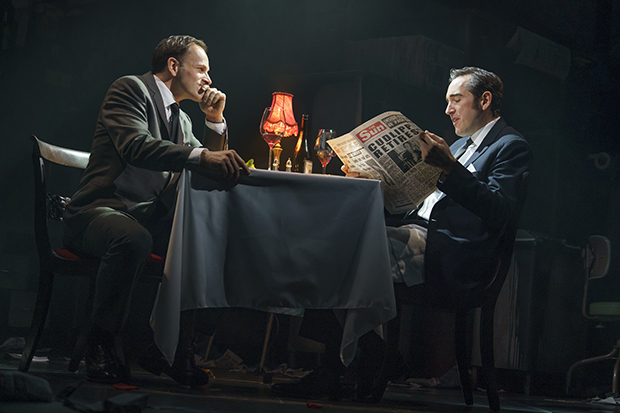
(© Joan Marcus)
The relationship between Ink's two protagonists grounds this jittery drama: Carvel portrays Murdoch with a Richard-like hunch and a perma-sneer. Even though Lamb has the intimidating facial scar, it's Murdoch who comes off like a Bond villain. This is also because Miller convincingly plays Lamb as a fundamentally decent man who never intends to take things this far — until he does. Lamb and Murdoch regularly huddle at (historically accurate and dramaturgically perfect) Rules Restaurant. As Miller stares at Carvel over a bloody steak, his eyes are those of a man on the highway to hell.
Ink is Lamb's tragedy, but the hubris entirely belongs to his "betters": the myopic Fleet Street preachers who thought it was their duty to moralize to the masses rather than acknowledge the truth of their existence. Eventually, those masses voted with their eyeballs and 5p.
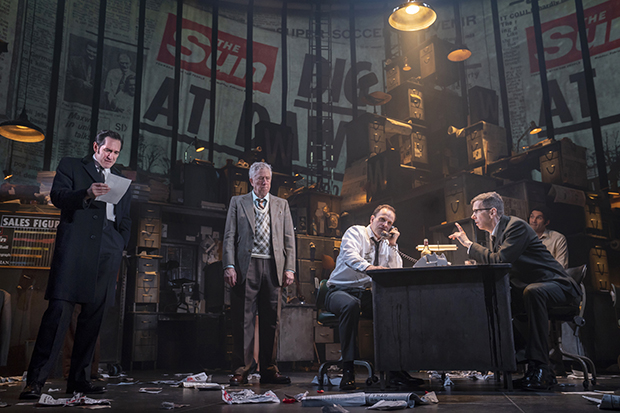
(© Joan Marcus)
It is tempting to shrug off Lamb's story as a product of British classism, but when the prerequisite for a job in the American media is increasingly an Ivy League degree and the ability to survive several years as an unpaid intern, are we really any better? The dumbstruck reaction to the last presidential election by the overwhelmingly upper-middle-class media suggests not.
That makes Ink a timely, if not particularly original, new play. That's fine: Some stories bear repeating until we finally hear them.










